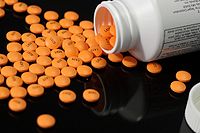
Photo from wikipedia
Background Patients with aspirin-exacerbated respiratory disease (AERD) are known to have poor clinical outcomes. The pathogenic mechanisms have not yet been completely understood. Objective We aimed to assess the involvement… Click to show full abstract
Background Patients with aspirin-exacerbated respiratory disease (AERD) are known to have poor clinical outcomes. The pathogenic mechanisms have not yet been completely understood. Objective We aimed to assess the involvement of the de-novo synthetic pathway of sphingolipid metabolism in patients with AERD compared to those with aspirin tolerant asthma (ATA). Methods A total of 63 patients with AERD and 79 patients with ATA were enrolled in this study. Analysis of mRNA expression of serine palmitoyl transferase, long-chain base subunit 2 (SPTLC2) and genotyping of ORMDL3 SNP (rs7216389) was performed. Results Significantly higher levels of SPTLC2 mRNA expression were noted in patients with AERD, which showed significant positive correlations with peripheral/sputum eosinophil counts and urine LTE4 (all P<0.05). The levels of SPTLC2 mRNA expression showed significant negative correlations with the level of FEV1 and FEV1/FVC (P = 0.033, r = −0.274; P = 0.019, r = −0.299, respectively). Genotype frequencies of ORMDL3 SNP (rs7216389) showed no significant differences between the AERD and ATA groups. Patients with AERD carrying the TT genotype of ORMDL3 had significantly lower levels of FVC (%) and PC20 methacholine than those carrying the CT or CC genotype (P = 0.026 and P = 0.030). Conclusion & clinical relevance This is the first study that shows the dysregulated de novo synthetic pathway of sphingolipids may be involved in the eosinophilic inflammation and airflow limitation in AERD.
Journal Title: PLoS ONE
Year Published: 2020
Link to full text (if available)
Share on Social Media: Sign Up to like & get
recommendations!